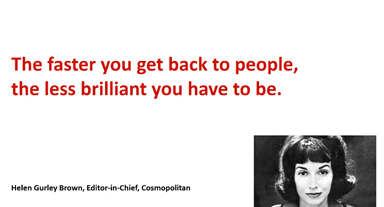More Haste, Less Speed
2 July 2021
“Lean is primarily a lead time reduction methodology”
I’ve said this sentence about a gazillion times, revelling in the fact that it took me too long to actually grasp this fact and that once I had grasped it, I needed to make sure I shared it with the world. Of course, lots of lean experts knew this already but there are still lots of lean people who focus on waste removal as their primary objective (sigh).
There are many brilliant reasons to focus on speed. If things take less time to enact, you free up capacity so you can do more. Customers love speed because they hate waiting, so they’ll want to pick you. Plus often, the longer things wait, the more likelihood there is that things will go wrong. The longer things take, the more work the organisation has to actually do because it has to deal with its customers ringing or emailing in, trying to find out what’s happening. There’s also a direct correlation between how innovative organisations are and how quickly they get stuff done. There’s no incentive to try new things if you know it’s going to involve tonnes of hassles and will absorb the next, however long, period of your life.
I also discovered a new benefit of speed from a presentation delivered by Ifan Evans, Director of Innovation in Welsh Government which I loved….

This revelation instantly resonated with me and whilst I’ve never clocked this phenomenon before, suddenly a million different interactions pulled sharply into view … does the same happen for you?!
The pursuit of speed drives so much of my working life but, let’s be honest, having this drive can be exhausting and frustrating. Frustrating when you are waiting for things to happen that you need to happen. Exhausting because I’m permanently in a race with myself to get tasks done and make sure that I’m on top of everything. Plus, you can definitely be too hasty and fast with some things….
I am a big fan of Nudgestock, “The World’s Biggest Festival of BS and Creativity” (where BS is Behavioural Science of course), you can review the whole 12 hours of it here, and one of the highlights was a particularly fascinating conversation between two legends, Rory Sunderland, Vice Chairman of Ogilvy UK, and John Cleese. John Cleese began his talk about ‘How to become more creative” at 05:48:41 = their conversation really gets going at 06:10:58. Both mourned the fact that society today is consumed with instant gratification and well, yes, speed. Rory even threw a McKinsey joke in there which was particularly genius. They then lauded and mourned the departure of ‘the overnight test’ or the “let’s sleep on it” pause as an amazing technique to distract the subconscious to then lead to, usually, successful conclusions.
John Cleese, in a closing remark stated that:
“Young people think that speed is essential for intelligence [that] if people are smart its because they are quick, not because they sit for a long time and then come up with something very, very smart indeed. One of the great faults of .. businessmen is that they need to be decisive, and they think decisive means making decisions quickly, no, it’s making decisions when they have to be made”.
This reminded me of THE biggest revelation that I had on the Cardiff Futures programme run by Cardiff University. Our Vice Chancellor delivered a session where he gave examples of things that occurred in the course of leadership where the best course of action was…. to do nothing.
That to do nothing was NOT an abandonment of duty, it was absolutely the right thing to do.
I can’t begin to describe how much of an anathema this concept was to me. Productive me, efficient and effective, LEAN me. To weigh up that the best course of action is…. to not do anything?!?!
Wow.
The more I understand leadership the more I appreciate that a lot of it is about the things that you DON’T do, the things that you DON’T say. (As well as the things that you do of course) and critically, how important pauses and time for reflection and not pushing people or things before they are ready, actually is and are.
So yes, upon reflection, I’ll be trying to better appreciate the things that benefit from fast, but allow myself to reflect on the things that are better slow. Not everything requires an action or reaction. ‘Delay send’ is my friend and I should listen to MyAnalytics’ ‘Food for Thought’ and Wellbeing messages more .. “During working hours you read over three quarters of your emails within 30 minutes of receiving them”… gulp.
- Working Smarter and Harder to Overcome Friction
- Mesmerising Mnemonics
- Recharging Batteries
- Marketing Magic
- What’s My Job Again?
- The Reports Have Gone to Her Head
- Cross Stitch Standards and Creativity
- Hefin David and the Aeroplane Arms
- Hankering for a Handbook
- Window of Light
- Defensive Organising
- McMullin’s Tandem of Co-Production
- The Joy of John Parry-Jones
- The Perils of Disappointment
- The Shield of Shame
- Customer Care and Organisation Innovation
- Hooray for Humanity!
- Angry Lemons
- Double Meanings
- Ticketing Masterplans
- When will it all end …
- Lifetime Loyalty and Taylor Swift
- Looking at Things Differently
- Networking Noodles
- Addicted to Truth
- Designs on Service Design
- The Multiple Joys of Universal Design
- Hungry Cultures
- Event Lean
- The Traffic Analogy
- Moving on Up
- Rosé Cava Revolution?
- Powerpoint Sneaky Lean
- Writing about Writing
- ChatGPT Response: Exploring the Art of Expression: Unveiling the Magic of Writing in the Style of Sarah Lethbridge
- Help to Grow Coldplay Style
- Caring IS Everything!
- Institutional Flapping
- “Just Do the Next Right Thing”
- Trust Thermoclines
- February 2026 (2)
- December 2025 (1)
- November 2025 (1)
- October 2025 (2)
- September 2025 (1)
- August 2025 (2)
- July 2025 (1)
- June 2025 (1)
- April 2025 (1)
- March 2025 (2)
- February 2025 (1)
- January 2025 (1)
- December 2024 (1)
- November 2024 (1)
- October 2024 (1)
- September 2024 (1)
- July 2024 (2)
- June 2024 (1)
- May 2024 (1)
- March 2024 (1)
- February 2024 (2)
- December 2023 (2)
- October 2023 (2)
- September 2023 (1)
- July 2023 (3)
- June 2023 (1)
- May 2023 (1)
- April 2023 (1)
- March 2023 (1)
- February 2023 (1)
- January 2023 (1)
- November 2022 (1)
- October 2022 (2)
- August 2022 (2)
- July 2022 (1)
- May 2022 (2)
- April 2022 (1)
- February 2022 (1)
- January 2022 (1)
- December 2021 (2)
- November 2021 (1)
- October 2021 (1)
- September 2021 (1)
- August 2021 (1)
- July 2021 (1)
- May 2021 (2)
- April 2021 (1)
- March 2021 (1)
- January 2021 (1)
- December 2020 (1)
- October 2020 (3)
- August 2020 (1)
- June 2020 (2)
- April 2020 (1)
- March 2020 (1)
- February 2020 (1)
- December 2019 (2)
- October 2019 (1)
- September 2019 (1)
- August 2019 (1)
- July 2019 (1)
- June 2019 (1)
- February 2019 (3)
- October 2018 (1)
- September 2018 (1)
- March 2018 (10)
- April 2016 (1)
- January 2015 (3)
- July 2014 (9)
- September 2013 (1)
